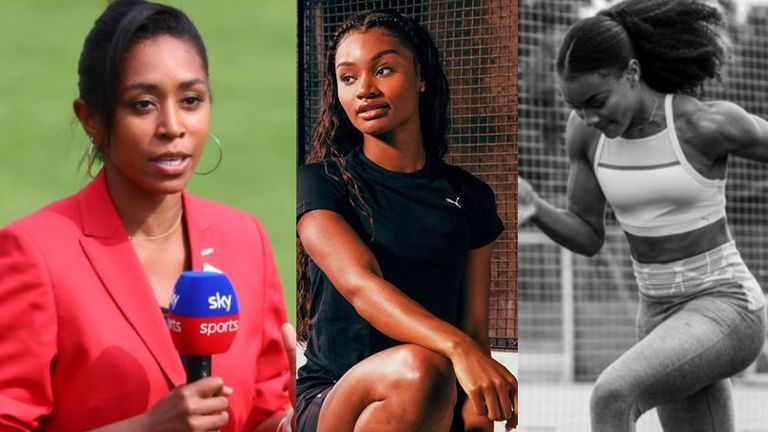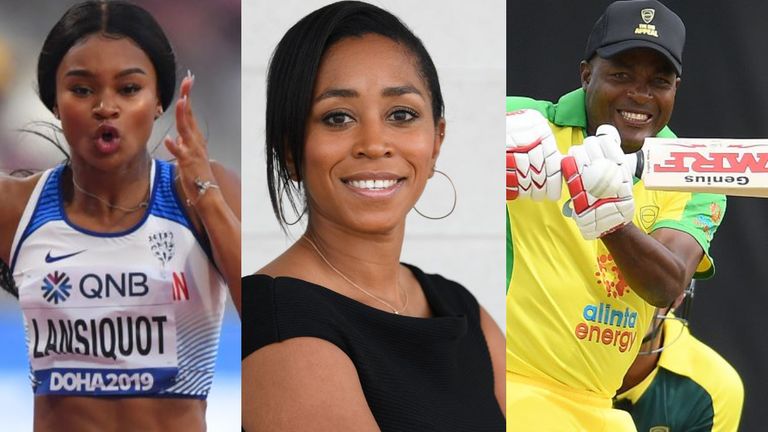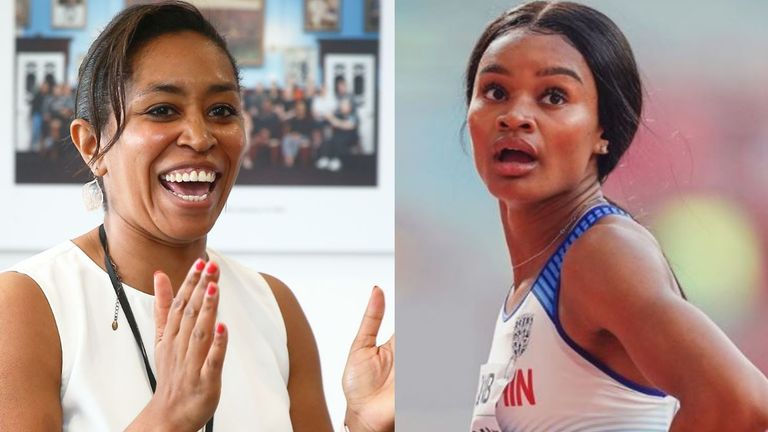Imani Lansiquot on cultural change, inspiring black athletes and interviewing Ebony Rainford-Brent
Imani Lansiquot reflects on a "harrowing" year, the reawakening of the Black Lives Matter movement, interviewing Ebony Rainford-Brent and her dreams of helping to end "ingrained racism within our culture"
Thursday 5 November 2020 13:34, UK
With Black History Month drawing to a close, British sprinter Imani Lansiquot is demanding more positive action that goes beyond hashtags as she dreams of medals on the track and inspiring cultural change off it.
The 22-year-old Sky Sports Scholar opens her heart on the Black Lives Matter movement, inspiring and educating the next generation and how interviewing cricket legend and broadcaster Ebony Rainford-Brent has given her a big lift...
The year 2020 has been an eye-opener to say the very least. A harsh light was shone onto current social affairs that both unified and divided parts of the country and forced us all to ask uncomfortably important questions that felt defining for the future.
The reawakening of the Black Lives Matter movement this year was probably one of the most emotionally harrowing times I have ever had as a young black woman in the UK.
The movement forced us all to face the reminder that while it may feel we have come a long way, we still have so far to go in terms of changing a culture and putting a stop to ingrained racism within our culture.
- NBA head coach: BHM 'should be every day'
- Being black in football: Past, present and future
- All our Black History Month content
In this, I feel it is so important for us all to remember that changing a culture goes beyond that 'flash in the pan' moment.
It goes beyond posting a hashtag or black square on your social media account. It even goes beyond October's Black History Month.
Evoking a change to culture requires consistent action and conversation over a long period of time. It requires a commitment to understand a topic that has no immediate solution or repair. It means turning conversations about negative experiences or ideologies into positive actionable goals.
There is a rich history of black sporting icons being pioneers of "culture change". From Mohammed Ali to Serena Williams, Lewis Hamilton to Ebony Rainford-Brent, we have seen time and time again how sport can greatly impact the conversation around racism.
Alongside this, sport plays such a huge role in one of my favourite quotes: "if you can see it, you can be it".
From first-hand experience, seeing somebody who looks like you breaking boundaries and gaining success opens endless doors for young people who may not have believed they could. It actively changes the culture by influencing the next generation to aspire for more.
I will feel accomplished in my sporting career if I can say that I played a part in changing the culture and continuing the conversations.
Of course, medals and fast times will play a paramount role in my legacy, but what is also very close to my heart is ensuring that I am showing the next young black boy or girl coming up that the possibilities are endless and that their potential exists and matters.
This Black History Month, of course, it is a time to celebrate positive black icons and understand that they play an integral role within the tapestry of all of our histories.
But we should also understand that the culture-change doesn't stop here. It is a long-term commitment to breaking the wheel, continuously educating ourselves and inspiring the younger versions of ourselves to know better and do better, no matter where you are from.
How can we make real change?
I am an avid believer that culture change has to start with the individual. We cannot wish for big changes in equality and diversity if we, as individuals, have not checked our own level of understanding.
This starts with educating ourselves better on the contributions of black British history to our nation's history as a whole.
It is about understanding that this contribution is woven into our healthcare, our popular culture, our sports, our enterprise and so many other industries and not limiting this acknowledgement to just October.
In the workplace, it is about recognising that diversity in the workplace goes beyond a "tick-box" exercise, but instead enriches and develops the future by bringing different backgrounds and opinions to the table.
Heroic Ebony
I had the pleasure of speaking with Ebony Rainford-Brent. Not only was it a huge honour to talk to one of my sporting heroes, but it was so eye-opening to gain greater insight into her story.
I was taken aback by her determination, grit and ambition, and it was made even more empowering to find out that we came from similar south London backgrounds with Caribbean heritage.
Ebony has experienced so many situations where she has had to be "the first" for women and black women in the world of cricket.
Despite this, she seemed unfazed and took it all in her stride.
She had a goal and wouldn't let anything get in her way, and it never came into question where she was from, or the colour of her skin, and she let her performances do all the talking!
Black History Month
Keep across all our features, news stories and video content on Sky Sports News and our Sky Sports platforms. Check out all our Black History Month content here





